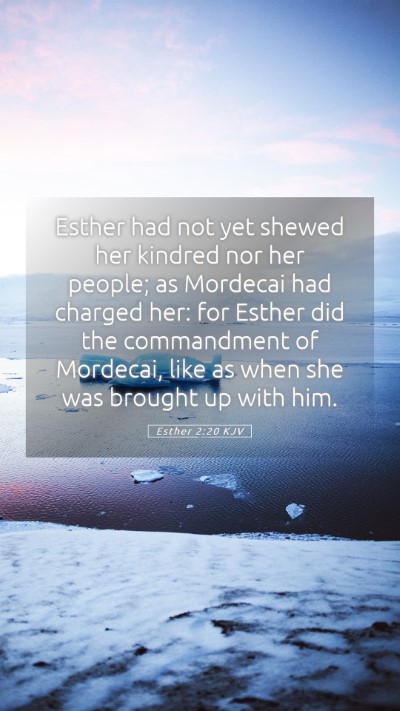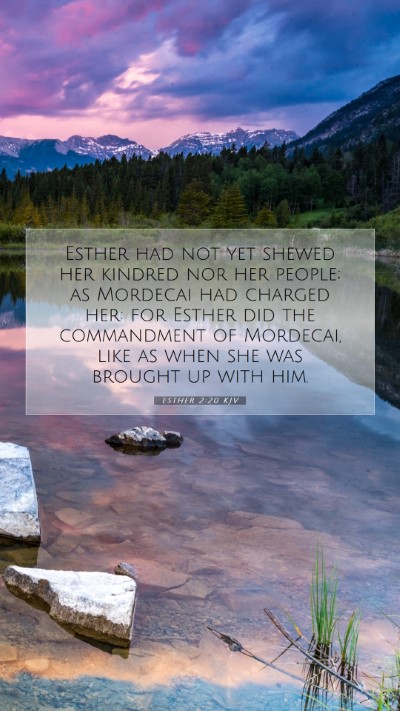Old Testament
Genesis Exodus Leviticus Numbers Deuteronomy Joshua Judges Ruth 1 Samuel 2 Samuel 1 Kings 2 Kings 1 Chronicles 2 Chronicles Ezra Nehemiah Esther Job Psalms Proverbs Ecclesiastes Song of Solomon Isaiah Jeremiah Lamentations Ezekiel Daniel Hosea Joel Amos Obadiah Jonah Micah Nahum Habakkuk Zephaniah Haggai Zechariah MalachiEsther 2:20 Meaning
What is the meaning of Esther 2:20?
Esther had not yet shewed her kindred nor her people; as Mordecai had charged her: for Esther did the commandment of Mordecai, like as when she was brought up with him.
Esther 2:20 Bible Verse Meaning
Understanding Esther 2:20
Esther 2:20 showcases a pivotal moment in the narrative of Esther, highlighting her obedience to Mordecai and her rising significance in the Persian court.
Bible Verse Meaning
This verse states: “Esther had not yet revealed her kindred nor her people; as Mordecai had charged her: for Esther did the commandment of Mordecai, like as when she was brought up with him.”
Contextual Overview
In the context of the Book of Esther, the verse illustrates Esther's identity and her adherence to Mordecai's instructions, emphasizing her humility and wisdom in handling her position.
Commentary Insights
-
Matthew Henry's Commentary:
Henry notes the significance of Esther's discretion in keeping her Jewish identity hidden at this juncture in the story. This act of obedience is portrayed as a wise decision, showcasing Esther's ability to navigate the challenges posed by her royal situation.
-
Albert Barnes’ Notes:
Barnes focuses on the commitment Esther shows to Mordecai, highlighting that her loyalty and respect for parental guidance are central to her character. It underscores the importance of familial ties and the influence of significant relationships in shaping one’s actions.
-
Adam Clarke's Commentary:
Clarke elaborates on the implications of Esther's concealment of her lineage. He suggests that this was an act of prudence, strategically positioning her for future events in the narrative, as later circumstances would require her to reveal her identity for the sake of her people.
Biblical Exegesis
Exegesis of this verse involves understanding the implications of Esther's actions and the underlying themes of identity, obedience, and the unfolding divine plan. The act of following Mordecai's instructions sets the stage for the deliverance of the Jewish people.
Key Themes
- Obedience: Esther’s adherence to her cousin’s counsel demonstrates the theme of listening to wise counsel, which is vital in navigating difficult circumstances.
- Identity: The struggle between Esther’s public and private identities poses questions about the complexity of embracing one’s heritage while assimilating into a different culture.
- Divine Providence: The events surrounding Esther signal a greater plan at work, indicating that God’s hand is present even when not explicitly mentioned.
Application of Bible Verse
This verse invites reflections on how individuals navigate their identities, particularly in challenging circumstances. It calls believers to appreciate the weight of decisions made in secret, which can lead to profound impacts on others’ lives.
Lessons Learned
- Respect for Guidance: Understanding the importance of those who mentor us in our lives.
- Strategic Discretion: Learning the value of patience and timing in revealing important aspects of one's life.
- Faith in Unseen Plans: Trusting that divine guidance is present, even when it is not immediately evident.
Cross References
- Esther 4:14: Highlights the pivotal role Esther plays in her people’s deliverance.
- Daniel 1:8: Discusses the importance of maintaining one’s identity amidst a foreign culture.
- Proverbs 3:5-6: Encourages trust in the Lord’s guidance in our decisions.
This comprehensive examination of Esther 2:20 contributes to our understanding of Bible verse meanings and perspectives. Through this biblical analysis, we are encouraged to deepen our Bible study insights and apply the wisdom of Scripture effectively in our lives. Whether in Bible study groups or personal online Bible study, embracing these teachings can enhance our Bible study tools and Bible study resources for a more enriching faith journey.


